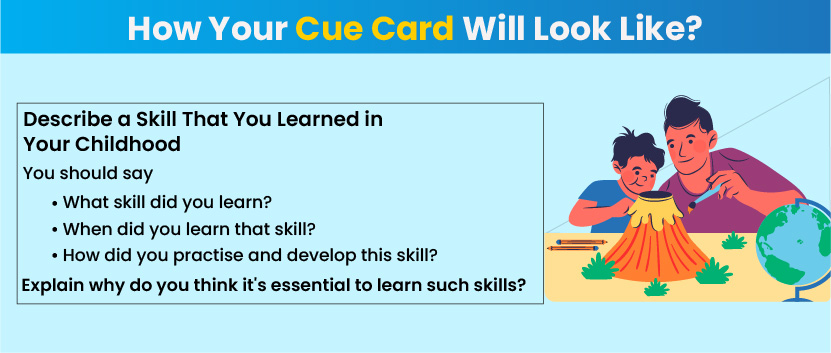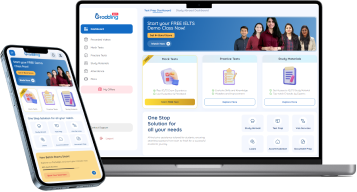In the IELTS Speaking exam, questions like "Describe a skill that you learned in your childhood" often come up in Part 2. This type of question tests your ability to speak at length about a personal experience and describe it in a clear, organized way. It's important to give a detailed, well-structured response that highlights not just the skill itself, but also the process of learning and how it shaped you. Here's how to tackle this question effectively:

Table of Contents
The IELTS speaking has three tasks. In the first section, you have to introduce yourself. Next is the cue cards, which is the part of IELTS speaking part 2 where you will be given a prompt (cue card) to speak on. It will contain a main question and 4 pointers that you; can cover in your answer. Part 3 of the IELTS speaking section contains the follow-up questions by the examiner based on the answers you gave in part 2. You will find them later in the blog.
There are many things that a test taker must take care of. So, before moving forward to this section, the appearing candidate must know the idioms and vocabulary for IELTS. This is so because using idioms and a huge word bank will leave a positive impression on the examiner. This will help the test taker to achieve the desired band score.
As soon as the IELTS speaking part 2 begins, you will be shown a prompt with the topic that you need to answer. Here is a list of questions that can be answered in the cue card with the topic "Describe a Skill That You Learned in Your Childhood".
Let us have a glance at your potential cue card on "Describe a Skill That You Learned in Your Childhood ". Refer to the image below.
Now, let us read various answers that you can give in your speaking section to ace the IELTS exam in the first attempt. In the upcoming section, there are three sample answers. You can use the nature, tone and style of these answers in the language proficiency exam.
Here, you will find the first sample answer on the topic, “Describe a Skill That You Learned in Your Childhood”.
You learn and unlearn many things every day. So, today, I’ll talk about the thing that I always wanted to do.
The skills I acquired were helping and taking care of the people. I had always wanted to help people around me. My parents saw my enthusiasm and decided to nurture me into it.
I learned this between the ages of ten and my early teenage years. As I previously stated, I already had it in me; it was just my parents who nurtured it and brought it out.
Moreover, this skill does not need practise but the willpower to voluntarily help people. Also, my mother always visited the less privileged or orphan homes to distribute meals and also the beggars along the street. During celebrations, I was always eager to help out in feeding people who did not have any source of livelihood. ;
This skill is necessary because it helped me choose my career path, which is nursing. As a nurse, one of the essential qualities is being a caregiver.
Being a caregiver has also made me more empathetic towards my fellow humans and the people I live with.
It made me value human life and how little care can drastically positively change a person. It has also made me better ;in building a family.
Refer to the answer below to know the style and tone used in the IELTS speaking part 2.
I am a learner. I never get tired of gaining new skills. It gives me strength and emboldens new development within me. I have learned numerous skills throughout my life and have inculcated each in various aspects of my life, making it easier and more convenient.
Today, I want to discuss a skill I picked up as a child for which I am incredibly thankful because it is helping me now and will continue to serve me in the future. This skill is cooking. When I was a kid, I used to see my mother prepare delicious meals, garnish them with coriander or milk-based candies, and prepare stunning desserts. I had joy and a sense of inner fulfillment each time I consumed one of her dinners. The food was tantalizing.
Suddenly, one day, I wondered why I couldn't cook the way she did. I was motivated to learn because I wanted to cook just like her. I told my mother that I wanted to learn to cook just like her when I was twelve or thirteen years old. After hearing this, she was emotional; her smile perfectly captured her inner feelings.
She promised to teach me. I used to get up early every morning and leave for school at about nine o'clock. When I woke up at seven o'clock, I would watch her cook. After about ten days, she allowed me to touch the stove, but only after taking all the required safety precautions because she understood I was still a little child.
I was over the moon during the learning experience, and after I mastered the skill, oh my god, I cannot tell you how I made a dish called Daldo, an authentic Gujarati dish.
Everyone in my home enjoyed the flavor that I made for them. I was ecstatic to have acquired this ability, which would benefit me in my future overseas studies.
In this section, you will find a sample answer that defines swimming as a skill learned in childhood.
It's a fundamental skill that not only serves as a form of exercise but also as an essential safety ability.
The skill I learned was swimming. I was taught to swim by my father. He was a keen swimmer himself and believed that swimming was a crucial life skill that everyone should learn. He was patient and encouraging, making him an excellent teacher.
My father started teaching me to swim when I was about six years old. We would go to the local community pool, where he would gradually introduce me to the water. He began with the basics, like floating and kicking, before progressing to more complex techniques like different strokes.
He used a step-by-step approach, ensuring I was comfortable and confident at each stage before moving on to the next. He made the learning process fun and engaging, often turning lessons into games, which helped me overcome any fear of water and actually enjoy the process.
I believe learning to swim is important for several reasons. Firstly, it's a vital safety skill. Knowing how to swim can be life-saving in situations involving water.
Secondly, swimming is an excellent form of physical exercise that benefits the whole body. It's a skill that encourages a healthy lifestyle and can be enjoyed at any age.
Additionally, swimming taught me discipline, perseverance, and the importance of practice. It's a skill that not only provided me with the ability to enjoy water-based activities but also instilled a sense of confidence and independence. Overall, learning to swim in my childhood was a significant and beneficial experience. It was more than just acquiring a new ability; it was about learning a vital life skill that has had a lasting impact on my life.
The lessons I learned in the pool went beyond swimming; they were about safety, health, and personal development. I'm grateful to my father for imparting this skill to me, and I consider it an essential part of my upbringing.
| Lexical Resources | Meaning |
|---|---|
| enthusiasm | a strong feeling of excitement or interest in something and a desire to become involved in it |
| nurture | to look after and protect somebody/something while he/she/it are growing and developing |
| emboldens | give (someone) the courage or confidence to do something. |
| less privileged | having less money, education, etc., than the other people in a society |
| empathetic | having the ability to imagine how someone else feels |
| essential | completely necessary; that you must have or do |
| lifestyle | the way that you live |
| swimming | to move your body through water |
| authentic | that you know is real or genuine |
| numerous | existing in large numbers; many |
| development | the process of becoming bigger, stronger, better, etc., or of making somebody/something do this |
| drastically | in a way that is severe and sudden or has very noticeable effects |
| fulfillment | a feeling of happiness and satisfaction |
| tantalizing | making you want something that you cannot have or do; tempting |
| ecstatic | extremely happy |
| progressing | to move something to a more advanced or developed state |
| importance | the quality is important |
| confidence | trust or strong belief in somebody/something |
| independence | (used about a person, country, etc.) the state of being free and not controlled by another person, country, etc. |
| grateful | feeling or showing thanks (to somebody) |
| imparting | to pass information, knowledge, etc. to other people |
| perseverance | continued effort to do or achieve something despite difficulties, failure, or opposition |
| emotional | connected with people’s feelings |
| childhood | the time when you are a child |
In the table above, you get a list of lexical resources with their meaning. All these lexical words were used in the sample answers mentioned in the above section. Also, they will contribute in enhancing your vocabulary and of course the high band scores. Let us know the follow-up questions that an examiner can ask you.
In task three of the IELTS speaking section, the examiner cross-questions the candidates with the answers they give. In this section, you will know the potential follow-up questions that can be asked.
These were the potential questions that your examiner could ask you. In the next section, you will get some tips to ace the IELTS exam in the first attempt.
You should keep the following things in mind while preparing for the IELTS speaking section. In this part of the blog, there are some expert tips. Following these tips will help you ace the speaking section on the first attempt.
Following these tips will be helpful in acing the speaking section of the language test in the first attempt. Moreover, this blog has 3 sample answers. As a test taker, you can refer to the tone, nature, and structure. Also signing up for the online IELTS classes will help you furbish your skills. The instant feedback report will make you aware of the areas to improve.

We are available in :
BangaloreAhmedabadJaipurHyderabadKeralaPuneChandigarhMumbaiGurgaonChennaiKolkataTrivandrumNoidaKochiCalicutKottayamKollamThrissurIndoreUdaipurdisclaimer:logos and other registered trademarks of universities used on this platform are held by their respective owners. Gradding does not claim ownership or association on them, and their use is purely for informational and illustrative purposes.


